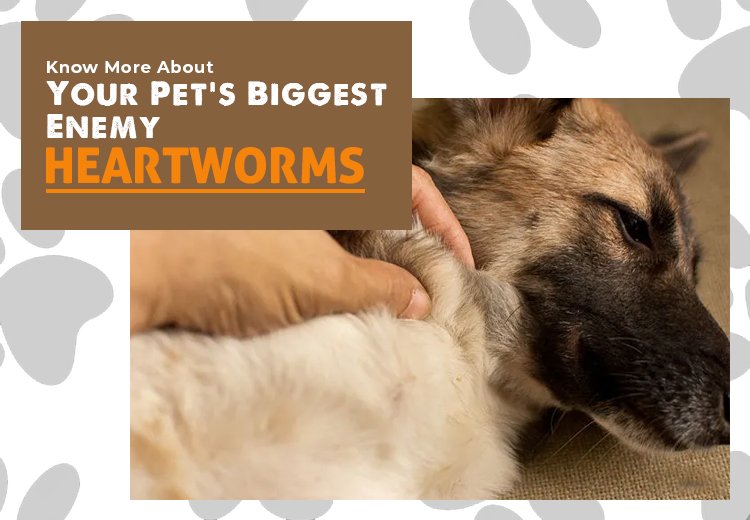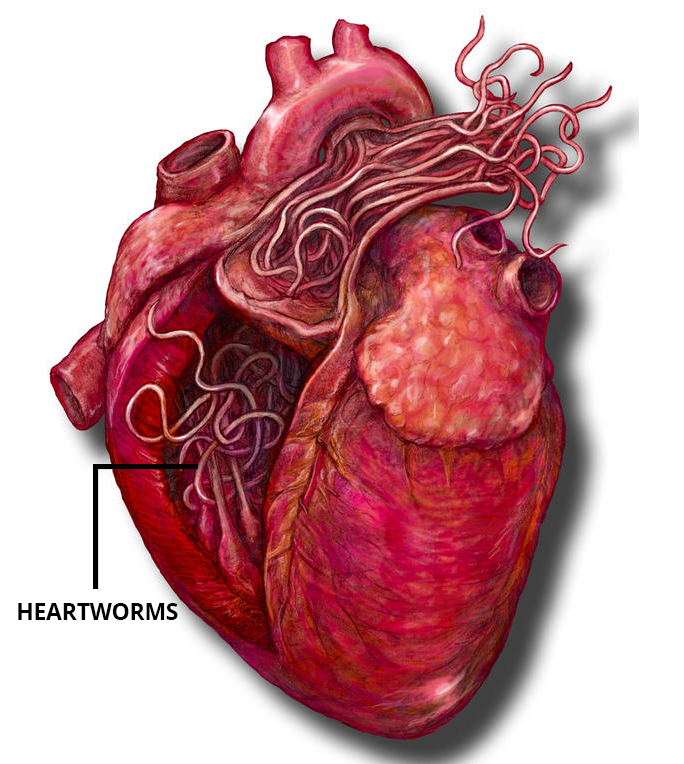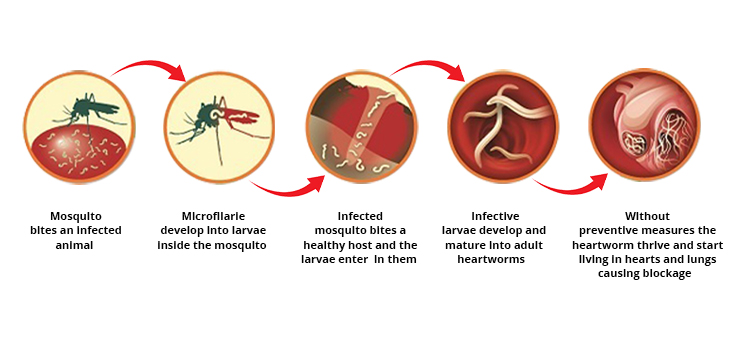 Apr 03, 2023
Apr 03, 2023

Does the name Dirofilaria immitis sound familiar to you? If not don't worry, we will learn all about it today; as heartworms pose a great threat to the health of your pet. D. immitis (heartworm), is a parasite that causes severe infection in the hearts and lungs of pets and it is potentially a fatal disease.
April has been designated as National Heartworm Awareness Month to help raise awareness about this dangerous disease and to promote timely diagnosis, treatment and prevention. During this month pet experts, social workers, and pet parents share their knowledge and let others know about the dangers of heartworm infection in pets, especially in dogs and keep pet parents updated on the preventive measures.
Heartworms are organisms that appear like cooked spaghetti. The female worm can grow up to 10-12 inches in length and the male worm can reach about 4-6 inches. They reside in the chambers of the heart, lungs and nearby blood vessels. This has a detrimental effect on their health and quality of life. In case of a severe infection, large number of heartworms can block blood flow within the heart, leading to cardiovascular collapse.

Heartworms not only infect dogs, cats, and ferrets, but also live in other mammal species including wolves, coyotes, foxes, sea lions, and in rare circumstances, humans. As wild species like coyotes and foxes live near urban areas, they are considered important carriers of the heartworm.
Difference in Heartworm in Dogs and CatsHeartworm infection in dogs and cats is very different. Dogs are extremely susceptible to the infection; cats, on the other hand, are the uncommon hosts. Dogs are natural hosts of heartworms. Once infected, the worms will mature into adults, reproduce and cause long-lasting, sometimes even life-long, health problems and damage. However, most worms do not survive to grow till the adult stage in cats, so it often goes undiagnosed. But, the immature form of worms can be fatal too; and cause Heartworm Associated Respiratory Disease (HARD). As there is no treatment available for cats, prevention is the only mean of protecting them.
Heartworm is a vector-borne disease, which is transmitted through a mosquito bites. When the mosquito feeds on an infected animal, it picks up the baby worms, called microfilaria, which develops into the infective stage or larvae. Then, when the infected mosquito bites your pet it transmits worms through the bite wound, directly into the bloodstream. Once inside the host's body, these larvae will mature into adult heartworms, approximately within 6 months.

Not all pets show symptoms in the early stages of the infection and some are even asymptomatic. As the severity of the infection increases, symptoms start to develop and the signs become apparent.
Some of the noticeable signs in your dog are:
As the disease progresses pets may experience heart failure and abdominal swelling. When the heartworms cause a blockage in the heart, it can be marked by the symptoms such as sudden onset of labored breathing, pale gums, and dark bloody or coffee-colored urine.
Some of the signs that you can notice in your cat are:
Heartworms are potentially deadly for pets. The treatment and recovery take a lot of time, energy, and money, and severely affect the health of your furry baby. Therefore, it is always best to prevent heartworms.
It all sounds scary, but with the right preventive measures you can keep your pet safe. A few steps you should take to prevent heartworms are:
* Puppies under the age of 7 months can be started with heartworm preventives without a test.
We offer a wide range of products, from big-name brands at the most affordable prices. Our aisle of heartworm preventive contains Nexgard Spectra, Heartgard Plus, Valueheart, and Interceptor Plus among other products.
If your pet gets infected and tests heartworm positive, your vet will recommend a course of treatment based on the severity of the infection. While your pet is undergoing the treatment, all the physical activities causing strain should be restricted. The heartworm infection can damage your pet's health faster with increase in physical activities.
Before commencing the treatment, the vet will first ensure that your pet's condition is stabilized enough to go through the treatment. According to the severity, complete recovery, including post-treatment care can take months.
Conclusion
Now that you have enough information about heartworms, you can keep your pet protected. Use this month as a cause for spreading the information and sharing it with all the pet parents. This will save our furry babies and give them a long and healthy life!
 Oct 10, 2024
Oct 10, 2024
Halloween is the perfect time of the year to bring out your freak and share it with your loved ones. Sweets, snacks, and drinks are the obv...
 Sep 16, 2024
Sep 16, 2024
Dogs are the most loving and loyal partners and safeguarding their health is the number one requirement that every pet parent should fulfil...